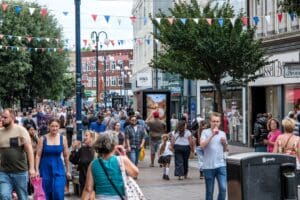
A new House of Lords report calls for a reimagining of UK high streets, emphasising the need to move beyond traditional retail to include more restaurants, leisure activities, and public services.
The decline of retail dominance on UK high streets has become increasingly evident, with over 10,000 store closures in 2023 alone. Communities have witnessed the loss of local department stores, pharmacies, clothing shops, pubs, and banks, leaving many town centres struggling to attract visitors.
According to the report titled “High Streets: Life Beyond Retail?” published by the cross-party House of Lords Built Environment Committee, there is a pressing need for high streets to offer a wider variety of services. This includes not only shopping but also dining, leisure activities, health centres, and libraries.
Lord Moylan, Chairman of the Built Environment Committee, stated: “Local high streets are places where generations have shopped, socialised, and worked. Many of them are in decline, and to reverse this they need to look beyond being simply a destination for shoppers.”
The report emphasises that local authorities, communities, and businesses must collaborate to create adaptable and resilient high streets that reflect local needs. A fixed, one-size-fits-all approach should be avoided in favour of flexible strategies that can evolve over time.
Key findings and recommendations include:
Implement a ‘town centre first’ policy: Ensure new public services like libraries, diagnostic centres, and local government buildings are established on high streets.
Appoint town centre managers: Each local authority should have an active manager to support high street development and share best practices nationwide.
Enhance accessibility: Improve public transport connectivity and provide sufficient parking to make high streets easily accessible by both car and public transport.
Create welcoming public spaces: Incorporate green spaces and areas where people, especially young people, can socialise without spending money.
Improve safety measures: Address concerns by enhancing street lighting, ensuring clear sightlines, and promoting a mix of uses that keep areas lively into the night.
Support local markets: Recognise the role of markets in boosting footfall and contributing to the unique character of towns and cities.
addressing challenges and future strategies
The Committee notes that previous government efforts to revive high streets were not well-coordinated. It urges the new government to implement local growth funding reforms that enable high streets to flourish in the long term and ensure those responsible have the expertise to deliver improvements.
The report also welcomes the announcement of plans to review the Business Rates system, acknowledging that taxation, funding, and the planning system significantly impact high street regeneration. It criticises the current model of local authorities bidding for central funding as expensive and wasteful, advocating for a more transparent funding distribution system.
Lord Moylan added: “Delivering a successful and sustainable high street often involves a local leader who motivates teams from the public and private sectors to use their imagination to breathe new life into their high street. Decision-makers shouldn’t be afraid of trying new things but should be mindful of the quality of what is delivered, as only well-designed and built spaces will stand the test of time.”
Read more:
Lords report urges shift beyond retail to revitalise UK high streets





